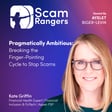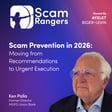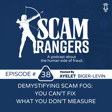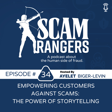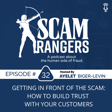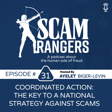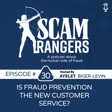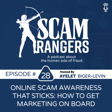Emotional Impact and Reluctance to Report
00:00:00
Speaker
It's shame. You might feel foolish. You experience frustration after being scammed. And as a result, a victim may not want to share what's happened to them due to these kind of feelings of shame or the worry that they're, you know, for an older adult, adult children might feel the need to take over power of attorney, over finances, leading to a loss of independence. So there's even implications for kind of telling families what happened.
Introduction to Scam Rangers Podcast
00:00:28
Speaker
Scam Rangers, a podcast about the human side of fraud and the people who are on a mission to protect us. I am your host, Ayelet Bigger Levine, and I'm passionate about driving awareness and solving this problem. Welcome to Scam Rangers.
Expert Insights on Psychology of Scams
00:00:49
Speaker
Today's scam ranger is Alan Castell, who's a professor in the Department of Psychology at UCLA. He studies learning, memory, and aging.
00:00:59
Speaker
and is interested in how people can selectively remember important information. He received his PhD from the University of Toronto, did a fellowship at Washington University in St. Louis, and his work has been featured in the New York Times, Wall Street Journal, and Time Magazine. His recent book is entitled Better with Age, The Psychology of Successful Aging. He recently also collaborated on several pieces around online scams and the psychology of scams.
00:01:28
Speaker
Hi Alan, welcome to the podcast.
00:01:30
Speaker
Thanks for having me. It's great to be here. Great to have you. In many of my conversations with law enforcement or other fraud fighters in the industry and just generally, I often hear, well, how did they fall for it? And one of the messages I've been trying to convey on this podcast is that it can really happen to anyone. One moment off guard, and this can happen to anyone. So what I wanted to do is double click into the psychology behind the scam.
00:01:59
Speaker
And I want to divide the conversation into two parts. The first part will focus on what happens during the scam, what tactics scammers use to manipulate the victim. And then later on, I want to talk a little bit about what happens after the scam, the emotional impact on victims, and what they could do to improve their situation. So first, I want to talk about why are scammers successful?
Vulnerability to Scams: A Universal Issue
00:02:25
Speaker
What psychological elements do scammers prey on?
00:02:29
Speaker
Yeah, I think scammers prey on our very basic instincts to be emotional. Every day we get excited about things, we're curious about things, we're trying to help family and friends.
00:02:41
Speaker
And scammers take advantage of this very basic human instinct. So, for example, you know, scammers will be monitoring Facebook pages, they'll see what sorts of phone calls you've been making, they'll notice whether you have children or not, these sorts of things that might be very publicly available on
00:03:00
Speaker
social media. So scammers aren't interested in your life and take advantage of our very emotional brain to try and catch us at times where we might be interested in some product, some offer, and some of the common tactics involve, you know, rushing, giving people a limited time offer,
00:03:19
Speaker
um safety of children there's all sorts of things that we're going to immediately let our guard down because we need to engage and help so i think scammers know some very basic psychology and and certainly exploit it so for example the more we share online the more susceptible we are to be scammed because we share information about our job on linkedin and our career and what
00:03:44
Speaker
we follow and who our colleagues are as part of that group.
Scammers' Tactics and Information Gathering
00:03:49
Speaker
We see a lot of scams that target employees as well, like the gift card scams and business email compromise. So they do all that work to learn about people and how does that help them get what they're looking for?
00:04:03
Speaker
Yeah, I think, you know, we're going to talk about the scam and then after the scam, but I think a big part of it is before the scam. Like you're saying, these scammers are doing their research and a lot of them are trained in terms of basic psychological principles of what, for example, an older adult will respond to versus, you know, a parent versus someone who's planning a vacation. And so once they get that information about what you're doing from, you know, what you're posting online or even, um,
00:04:31
Speaker
even prior phone calls you've made if they see construction outside your house. All of this is available through Google, too, where you don't even need to be on social media. So you have to have your guard up because they're going to take advantage of our basic interest in
00:04:48
Speaker
having a good deal even. So it's not just about romance necessarily or winning a lottery, it's you've contacted four people to get a roof estimate and somehow they call that information and now they're calling you about some too good to be true estimate where you just need to wire them some money in order for this to happen.
00:05:08
Speaker
It can be from the very mundane to the very exciting. And I think scammers take advantage of our interest in protecting our family, our interest in going on a trip, our, you know, whatever our interests, our hobbies are, and a lot of it is consumer psychology, obviously.
Scammers Targeting Strategies
00:05:23
Speaker
If we're online shopping and we've been looking for something for a couple of days, all of a sudden we get a phone call or a text or something and we're not sure. Is that really Walmart or is that someone posing as Walmart because they've been monitoring the kinds of activities we've been engaging in?
00:05:40
Speaker
A lot of research is happening before, but it's a numbers game. Scammers are not just targeting you. They're targeting thousands, millions of people to see who's going to answer or who's going to click on something. So even though it feels very personalized and that they're going after you, they're going after so many people at the same time just waiting for someone to kind of respond or catching someone at a time of day when they're rushed or concerned or worried about something.
00:06:08
Speaker
Right. So I would say there's a scam for everyone. And you published an article in Psychology Today, which will put the link in the show notes to that article. And you talk about populations who might be more likely to be manipulated by a scammer. So I wanted to ask, are certain populations more susceptible than others to fall for a scam like age, gender, social economic, education?
Demographic Impact of Scams
00:06:36
Speaker
What are your findings there?
00:06:38
Speaker
Well, I think the broad answer is we're all susceptible to scams at any given time, depending on what we're interested in doing. And I think the stereotype is that it's the older adult who's lonely who answers the phone and wants to talk. But in fact, the data suggests quite a different story, and that could be that
00:06:56
Speaker
It could be a middle-aged person who's quite sophisticated and has a high level of education, who's overconfident in their ability to detect scams. They've never, you know, they don't think I'll be duped, they're a lawyer. And in fact, they're just as susceptible and sometimes even more so depending on the context. So I think that's where we have to start is that we're all susceptible. And when we hear about these scams, we might think, oh, well, that could never happen to me, but you're not in the heat of the moment. And when you are,
00:07:24
Speaker
It's a very different emotional brain that kind of takes over. So I think that's the first thing to consider is that there's not one profile of this is the person who's going to be scammed. On the other hand, older adults have more to lose often. They might have a home that's paid off or they might have assets that are readily available compared to the college student who doesn't have that kind of thing. And so if a college student is scammed, they might just get identity theft or lose some amount of money.
00:07:54
Speaker
And often that will go unreported because to them it's like, oh, shoot, there's a scam. Oh, well, on to the next thing. Whereas for an older person, it could involve hundreds of thousands of dollars. It could involve houses. So the stakes are higher. And so we have to look at reporting levels, which aren't always accurate. So I think that's the starting point. And that's the point of trying to make in the article as well is that
00:08:18
Speaker
We're all susceptible, and if you've been scammed, you can't take it personally like it was just you. You're one of millions of people who are targeted every day, and you were scammed one day for one thing, but you might not fall for another thing. So it's not like there's some person out there who's like, oh, this is the person who's going to fall for everything.
00:08:37
Speaker
Um, and I've certainly had personal experience where I've been, you know, seen scams and even gone very far down until I realized, wow, wait a second. If, if my wife told me she, this happened, or if my grandparent told me, I'd say, stay away. What are you doing?
00:08:52
Speaker
So I think sometimes taking that third person role can also be helpful because we see it every day, but it's not always reported. So I think that's kind of the long answer is that we all are susceptible, but there are certain kind of things that can trigger a scam in any of us. And it comes down to emotion, trust, interest, boredom, loneliness. All of these things can contribute, but I don't think there's one thing that makes you a prime target necessarily.
Trust Building and Long-term Scams
00:09:21
Speaker
There was this in the UK, this campaign called stop and take five to stop the scams. And just like you're saying, it's a good technique to act as a third party. And you said something a few minutes ago, that emotional brain, I wanted to ask you about that. And
00:09:38
Speaker
In the article you also mentioned research by David Lazarus stating that some victims were so overcome by a con artist's voice and their tactics that they felt that they'd been put under an hypnotic like state and acting without a sense of logic. What happens there?
00:09:55
Speaker
Yeah, I mean, just to call it an emotional brain is probably an overgeneralization, but we have very basic instincts for survival, for kind of, you know, getting what we need, for helping people. And so, preying on these sorts of instincts makes scammers very successful. And to get there, sometimes it requires a little bit of trust or requires a dire situation or
00:10:16
Speaker
act now, limited time, and all of a sudden, or something, you know, even in this case that David Loseras reported on, you know, sometimes it can be things like your reputation, you know, like there's also a big case for therapists who are, you know, the scammer would call and say that their license was in jeopardy because they either hadn't paid or something was
00:10:39
Speaker
you know, wrong with some of the training they had, these sorts of things. And it puts us on the defense all of a sudden. And so now we want to do whatever we can to fix this. And that's where our emotions take over, kind of this fight or flight.
00:10:51
Speaker
And we're not using kind of more rational approaches of like, wait, how did you get this information? Or, you know, why, why are you just calling me now about it? Or why is it so important that it happens right now and I pay you in gift cards? So I think the take five approach is a good one because it takes us away from this kind of act now act quickly before it's too late to, Hey, you know, can I call you back in five minutes? Or this is really important. Can you send me this by email so I can, you know, act on it?
00:11:20
Speaker
And then you'll find that these scammers are going to be like, no, we need to do this now. Or maybe they will give you a callback number and you call them back and they answer. But that doesn't necessarily mean you can trust them. So scammers are building off these emotions. And one of them is trust. So not all scams are like someone yelling at you and act now. Sometimes I think you've spoken about this. There's this buildup of trust and pig book during catfishing where
00:11:46
Speaker
It's kind of the slow play where it's establishing trust. You're now not going to tell anyone. Maybe it's a romance. Maybe it's someone you don't want to tell other people about. And you feel very honored or special that they're reaching out to you and you start to trust this person.
00:12:03
Speaker
And in the case that David Lazaras reported on, this was a case where the voice just takes over. The person who's talking to turns into this person that you trust, who's giving you what seems like good advice or financial advice. And maybe there have even been some rewards already that you've invested some money and a week later it's made money. So now you think, well, that checks that box. I can trust this person. And then you kind of continue along.
00:12:29
Speaker
But again, if you had told someone else that this is happening, they'd be like, but why are you investing Bitcoin? You've never done that before. Why are they asking for gift cards or how do they know that you bank at this bank account? And that's where you have to take this, I think, giant step back to kind of evaluate, how did I get into this situation?
Exploiting Emotional Vulnerabilities
00:12:51
Speaker
And it's really interesting. You mentioned the relationship scams that lead up to pig butchering and Bitcoin and others and or romance scams that are much longer in terms of the creation of the relationship. I wanted to ask you about the trust, the creation of that trust. How does that go? And what is grooming? Is that related to that at all?
00:13:12
Speaker
Yeah, I mean, this is something that even in a conversation with anyone you first meet, you're kind of getting a feel for the person and, you know, what sorts of questions are they asking? And is it someone you'd engage with in the future? And so, you know, con artists know that a big play is confidence. How confident are you that I can trust, you know, what you're saying, what I tell you? And so this is kind of built up and sometimes with kind of small rewards or saying, you know, providing information that you think, well,
00:13:41
Speaker
If they know this information, I can trust them. Again, a lot of this can be available on Facebook, and that might be where an older adult might not be aware. Like, well, they knew my
00:13:50
Speaker
Granddaughter was in Mexico and they you know that she was with her friends so they and then she got hurt So I need to send this money to help her so all of a sudden this trust is kind of built in that Because they know this information there. They're trying to help let's say I need to I need to cooperate and I think that's the big part is once you trust someone even for a little bit It turns into this relationship that you're having with a complete stranger who's usually in a different country
00:14:16
Speaker
and has no, you know, is not interested in helping you at all. But, you know, there's even a release of neurotransmitters that's going to lead to this interest and trust and helping. And scams take all these different varieties from trying to, you know, help a granddaughter in need and don't contact the parents, grandpa, because I need
00:14:36
Speaker
You know, I need you to help me to, you know, a romance scam or even we've talked funeral scams, which I think are in some cases horrible, but I think a really good case in point that you're adding a very unique emotional time in your life. Someone's just passed away.
00:14:53
Speaker
You're planning a funeral, you've recently gone to a wake or a funeral and then you get this call saying that a bill hasn't been paid or you need to put this deposit down or you're going to lose the plot or the date or some other thing. And of course you're going to trust this person because you've had interactions, they're using the funeral home name.
00:15:10
Speaker
And you're at a point in life that you just are rarely at where your emotions are drained and you really just need to react. So that's unfortunately a horrible scam, but I think it's one that we need to be even more aware of because it's not going to happen frequently. But when it does, you have to put on this kind of signal of like, I'm in this emotional state. I need to be aware of the decisions I'm making.
00:15:36
Speaker
So when people are in, when they realize that they're in a more vulnerable state, knowing I might be now more susceptible to scams too. So I need to be kind of double on alert for and question the interactions that regarding financial transactions may be in particular that are happening.
00:15:56
Speaker
Sure financial relationships people will come after you at times where you're vulnerable whether it's a car accident you've been in and now you get a call from insurance companies and you know which insurance company is legit and how
00:16:09
Speaker
Are you giving information freely to people over the phone when some event has just happened in your life that is causing a lot of stress and strain? So I think it's unfortunate because it's a very challenging time in life, but it's also a time where we have to put up our radar. And so those are the unfortunate events, funeral, car accident.
Urgency and Threats in Scams
00:16:29
Speaker
But on the other hand, it could be things like a vacation you're planning, which is just the opposite, where now you have this kind of very positive, excited emotion.
00:16:36
Speaker
But then you get a phone call saying your flight's been delayed and it's going to be another three hours, so you don't need to come to the airport, but it's a scam. Or you've been planning this vacation and all of a sudden now you're getting an offer for a flight that's much cheaper and you know it's through the company that you've been looking through. So if you provide a quick transfer of money, you can get these tickets, but they're going to expire soon. So again, the tactics are preying on our interests, our emotions,
00:17:04
Speaker
Also, there's a rushing component. And usually when we're rushed, we make quick decisions that can kind of get us into, you know, get us in or out of a situation quickly. But usually we have this approach, you know, take when it's like limited time offer, act now, or, you know, someone's in danger, why are the money quickly? Don't tell anyone else. It makes sense in a way that we should act very quickly. That's what we're being told to do.
00:17:31
Speaker
So it's hard to remove ourselves from these situations. So I want to talk about a story that happened. We'll put a link to this, the story in the, in the show notes about social workers who were scammed. And in particular, this case is really.
00:17:48
Speaker
heartbreaking because the social worker was called and threatened that she didn't arrive to court and she goes to court from time to time to testify because she's a social worker. She helps people and she was told she didn't arrive to court and she has to come by or pay something because she was late or because she didn't arrive.
00:18:11
Speaker
The situation is really interesting. It escalates slowly and then very quickly. And before we get into that, I can share a story of mine where I got this IRS robocall a few years ago and they said, you know, this is the IRS. We need you to press one to contact us, to talk to our representative. I knew it was a scam. I knew it was a robocall scam, but I wanted to see how it works and try to kind of, as a researcher,
00:18:39
Speaker
Realize what what the tactics are so I pressed one I got to the person that he asked me for my he was very nice He used an American name John Smith or something with a very heavy non-american accent red flag number one and Then he asked me for my personal information First name last name some so I made up some some names and gave him the information and then he said oh yes I can see your account has a problem with it and
00:19:09
Speaker
And it started with like a regular, a very normal problem of funds that were not paid or something like that. And then I started kind of arguing and said, no, but I submitted everything on time and it should be fun. And then the situation escalated and it started with something happened to the FBI are on the way to your house to arrest you. You're wanted for drug smuggling and money laundering and all these things that are happening. Now I knew that I gave fake information and that I don't live in Texas.
00:19:39
Speaker
But my heart rate went up like crazy. I suddenly said, oh, God, they have my phone number. Maybe that's the only piece of information that they might have had. And I freaked out, although I knew everything was fake and I knew this was a scam. And so it still impacted me emotionally. So thinking about someone like the social worker who
00:20:01
Speaker
really thought she was talking legitimately to the clerk from the court or something like that.
Case Study: Social Worker Manipulation
00:20:07
Speaker
So what happened in that scam story was they started with, you have to pay a fine. And she went, they told her to get up cash and then put it in a box somewhere next to the courthouse. She could only, they asked for thousands of dollars. There was a limit to what she could withdraw from the ATM. So they asked for gift cards.
00:20:26
Speaker
And then she went from store to store to try and get gift cards. And someone there asked her, actually, one of the CVS workers asked her, put a sign, are you being scammed right now? Because he could see the emotional distress she was in. He knew about these types of scams. And she tried to kind of ask question the scammer who called again a few minutes later from a spoofed phone number pretending to be that place again.
00:20:55
Speaker
or gave her a phone number and she really didn't get the help that was offered to her. She was so enmeshed in the scam. And I wanted to ask you, how does this situation go between being friendly and supportive to her understanding that she needs time and to go to stores and acting as that power of authority in a kind way, but then escalating to being mean and scaring her, how does a victim
00:21:23
Speaker
feel in that situation and how does that build the stamina, quote unquote, to continue? And I know that if her third party hat was on, she would say, what am I doing running around the town buying gift cards? But she was inside. Yeah. I mean, this sort of scam involves kind of the buildup of trust. Someone's calling you.
00:21:42
Speaker
and saying they're aware of something and they want to help you. They want to make sure that you have some outstanding debt or you fail to show for jury duty, but we can make
00:21:54
Speaker
you know, take care of this somehow. If you provide some information or come down to the courthouse and if you, you know, bring gift cards or transfer money. So at first you're thinking, gosh, I'm vulnerable, you know, I'm a therapist and my license is being called into practice or I failed to show for jury duty something that might have happened to this person in fact. And they're like, oh, you've got me.
00:22:17
Speaker
but you're trying to help me. So I'm going to play along because I feel like now I'm caught in this path of you found something out about me and I need to now make it right. And so I think that's the first part of this sort of scam is like it's not quite it's a trust component, but it's also that
00:22:34
Speaker
I need to fix something that might not be accurate. And so in your case, you knew that it wasn't accurate, but it sure sounds like it's a possibility and you want to make sure it's cleaned up off your record. And even if it is inaccurate, you want to make sure that it's taken care of and this person is going to help you with that. So now you're on the same team here and you're engaged.
00:22:55
Speaker
And then at some point you might start to question things or say, well, that doesn't sound right. And the person's like, look, you're wasting my time. I'm trying to help you. Now it turns into this kind of, this person is the dominant person telling you what to do. And that can kind of take over. And so all of a sudden a very intelligent person who
00:23:12
Speaker
counsels other people. A social worker is now in this position where they're like, I have to fix this. I have to make sure this is taken care of. I'm going to get these gift cards, even though it seems crazy. But this is what has to happen. So these are really unfortunate situations. But I think it goes to show that very intelligent people who have training in a profession that might be related to this
00:23:35
Speaker
are going to be caught up in these sorts of kind of long-play scams that aren't just someone yelling at you from the beginning where you hang up the phone, but someone who's identified some insecurity or vulnerability that might actually be accurate. In some cases, you know, maybe some license has been not paid for, or there's an outstanding parking ticket that you might have forgotten about.
00:24:01
Speaker
And again, it's a numbers game. So this is not just happening to one person. And so I think in these cases, it's good to report on, and this is something else we can touch on, these case studies, because it helps people understand, oh, wow, that happened to someone I know or myself or a trained professional.
00:24:19
Speaker
But again, I think we think, well, that was them and they got caught up in the heat of the moment, but it wouldn't happen to me, especially after I've heard all of this. It just doesn't make sense. It doesn't add up.
Barriers to Reporting Scams
00:24:30
Speaker
But that's your rational brain taking over when, you know, these are very stressful situations that scammers will put you in often with kind of rushing people, shouting, revealing personal information.
00:24:42
Speaker
kind of outlining consequences of if you don't do this, you're gonna lose your license, it'll be in the newspaper, these things that people are quickly thinking, gosh, even if this isn't accurate, I need to avoid this.
00:24:54
Speaker
So I wanted to shift gears and talk a little bit about what happens after someone is scammed. And you talked about the importance of reporting. And in the Psychology Today article, you also talked about the fact that people who are victims of scams often feel ashamed and too embarrassed to report or seek help. And we know that less than 10% of people
00:25:16
Speaker
report scams. We really don't know the magnitude of the problem because we don't know what we don't know. But we can know statistics of robocalls that are reported versus robocalls that are not reported that are happening and things like that. And it's at least 10% or tenfold than the reported problems. And it could be cases where people are in romance scams and they're not supposed to be in a romantic relationship, maybe outside their marriage or not sharing with their family. So
00:25:43
Speaker
I wanted to ask you, what is the potential impact to the victim of not sharing and not reporting these scams? Yeah. Well, I think the first thing is when you've had this experience, you've, you experienced a certain level of helplessness. It's shame. You might feel foolish. You experienced frustration after being scammed. And as a result of victim may not want to share what's happened to them due to these kinds of feelings of shame.
00:26:09
Speaker
or the worry that they're, you know, for an older adult, adult children might feel the need to take over power of attorney, over finances, leading to a loss of independence. So there's even implications for kind of telling families what happened. And with a romance scam, there could also be many reasons why someone doesn't want to reveal what's happened. So people kind of bottle up what's happened. And this can lead to kind of a form of isolation and a sense of helplessness.
00:26:37
Speaker
But like with any sort of experience or trauma, we need to at some point kind of address it and either talk to a professional or a support groups who aren't going to be judgmental. And so that might not necessarily be family members. Um, so, you know, when, when a victim of fraud, you know, feels this, this isolation, it can, it can really exacerbate the experience experience leading to even more loneliness.
00:27:03
Speaker
which can then kind of be cyclical and lead to even future victimization. So, you know, it's sometimes not the case that someone's just been scammed once and they'll say, well, that was terrible. It'll never happen again. Well, you're on a list now and you could be, you know, contacted multiple times and it's going to be a different scam. And five years later, there's some other opportunity. So it can be a strange process that you think that you're done with and you're not.
00:27:33
Speaker
What you said about the elder adults that are under a threat of potentially their family taking the power of attorney or dealing with their financials or even perception of cognitive decline.
Education and Awareness as Prevention
00:27:47
Speaker
For some, it's not even the actual taking of the independence, but it's the perception of their family that their cognitive abilities are starting to get degraded.
00:28:02
Speaker
Wondering what can they do? What could you suggest to someone who is being scammed and is afraid that all of this will happen if they share?
00:28:15
Speaker
Yeah, I think, you know, first of all, we have these stereotypes of who's going to be scammed. And that's why I'm always hesitant to say it's this one type of person. And even using terms like scam and duped and kind of fooled makes people think, well, this is not the kind of thing I want to report. They'll think it's their fault, first of all.
00:28:33
Speaker
you know that it happened i got scammed versus the truth is you were targeted by a scam along with millions of other people and a few thousand are gonna fall for it and even when i say fall for it makes it sound like it's your fault so i think we have to take kind of the the blame off the individual and say this is a numbers game
00:28:52
Speaker
you were scammed this time you might not be scammed the next time it's you know smart people are scammed i you know i even tell people it's actually people with higher levels of education who are often scammed so it might make someone feel okay that it's like oh gosh i'm an engineer or a lawyer
00:29:09
Speaker
They're not going to want to report this because they feel like it's just something that they're completely embarrassed by potentially. But if you go to the Federal Trade Commission site or AARP or other sites that report on this, I think you'll feel a little bit better because you'll see just how common these things are, how they happen to everyone.
00:29:28
Speaker
and how it's not something that you should kind of keep inside because you're actually helping other people and helping agencies when they can say, look, this scam is this frequent. These are the tactics that are used. We need funding to address this sort of thing. And so if you think about your helping other people, not just yourself, and hopefully there aren't consequences for reporting it because I do think that's true. If you just tell your family members
00:29:55
Speaker
especially younger family members, they'll say, oh, grandpa was duped or, oh, dad can't answer the phone anymore. We need to intervene. But the truth is these younger people are just as susceptible to the right type of scam. And I was saying, you know, college students have been scammed for student loans.
00:30:11
Speaker
because they know, oh, there's a student loan forgiveness program and it's in place and next week they get a phone call and they provide their social security number to kind of get, and it's just, you know, these are things that if I said, oh, this is what grandpa did, they'd be like, oh, grandpa, how did he get duped? He told them it's social. So I think the context really matters, but we draw kind of these sorts of conclusions.
00:30:36
Speaker
So I think the stereotype of the older kind of lonely victim is not the case necessarily. And because of this underreporting, we don't know exactly these sorts of statistics. And the more we know, the better we can be armed to protect people.
00:30:55
Speaker
And the more we talk about it, the more we lower the shame around it. So thank you. Yeah. And it's just something that's even so common now. It used to be maybe less common, but now just with social media and there's not just an email scam, there's romance scams, there's funeral scams.
00:31:12
Speaker
it's it's ever-changing so i'd like i'd love it when people tell me about the scam whether happened to them or not and sometimes people say of this happen to someone i know sometimes i'm thinking yeah someone you know who might be your spouse or yourself uh... or it came it almost happened to you but uh... i think it's brave when people come forward and talk about these things and it shows you know especially like in the social worker case you think this is the type of person who might be on high alert for for these sorts of things but
00:31:41
Speaker
I think it just shows we all have an emotional brain and even saying it's emotion. It's actually sometimes rational when you think of highly educated people being scammed. Sometimes it's because they rationalize why this could be a good deal or why their flight was canceled.
00:31:57
Speaker
but they're being rebooked for tomorrow. They're like, oh, right, the hurricane is happening. And so you're making all these connections that, because you're very intelligent, then make sense to you at that time. Whereas if you take a step back, you're like, why was I making these connections? I was just helping the scan evolve. But it's because we try and make sense of the world. And so I think it happens to people in all sorts of scenarios, education, race,
00:32:25
Speaker
uh but it really depends on the context yeah i know i'm guilty of trying to make sense of things and uh that always gets me into trouble not not just scams just it gets you out of trouble it gets you helping people that's about profession for some people like the social worker you're trying to really understand things but sometimes you make sense of you know these
00:32:49
Speaker
trying to allow you to connect the dots, and that leads us into thinking, oh my gosh, this is actually, I can get this for a better price, or I should pay this bill now, or I did miss this jury duty, now I can take care of it. And so you're really kind of being a human, and that's what's being taken advantage of.
00:33:13
Speaker
When I say it's emotional, sometimes people think, oh, these people get emotional and they caught up. It's not just emotions. It's just kind of rationalizing why this could be the right thing to do. So you talked about the fact that people who don't report might isolate themselves and feel lonely and kind of go into the cycle of the scam. And I wanted to ask, how do you think scam victims can improve their well-being and actually seek help
00:33:42
Speaker
to improve their situation? Yeah, I think we need to be careful, kind of the positions we put ourselves in. So sometimes even just answering the phone or checking our email puts us in this situation that we're, I wouldn't say not prepared for, but as soon as you answer the phone, the other person might have your attention. Or as soon as you check emails and it's late at night and you're tired.
00:34:06
Speaker
I think I talked to one person who said, I'm glad I'm finally retired because I have all this email I haven't read in my spam folder. I'm thinking, wow, that's just a direction that can lead to all sorts of problems. But I think that's the first step is to be very careful about who we're around and what information we read. And that's what I talk about in my book, Better with Age.
00:34:31
Speaker
As we get older, we're more vulnerable in some ways. And so we really need to surround ourselves with people we trust, be around the people we care about.
00:34:40
Speaker
and maybe not be so engaging. You know, curiosity is a great thing, and this is research we're doing now at UCLA. Curiosity, we think, is a good thing normally, but it can also lead us to kind of explore avenues that we shouldn't be getting into, or trying to look for a better deal, or do more research, and that can lead to some problems. So I think, you know, that's the first step at the very beginning, is the kinds of positions we're in, what's posted on social media. It's not just what we're posting, it's what our kids are posting.
00:35:10
Speaker
And then we have to be aware of the reason that someone might have information is not because they know it, but because they're on some Facebook page.
00:35:19
Speaker
I think that's the first step is just more awareness. And that's why I, you know, I enjoy doing these podcasts because I feel like I learned a lot about all of these emerging scams. And I think the more people are aware, not that everything is a scam, but you need to be on alert. And it's rare that you need to react quickly to get something, you know, even, you know, buying a house takes a couple of months, you know, buying an airline ticket, even though we can do it in a few clicks now.
00:35:44
Speaker
you have 24 hours to cancel. So there's, you know, there's reasons why we might not need to rush through everything and take our time. But sometimes thinking through things can lead us into more problems as well. So talking to other people can be helpful. I think, you know, look, I'm in this or I'm thinking about this and that can be useful. Sometimes the scammers will not let you talk to someone else and they'll try to, they'll try to make sure that you don't take five.
00:36:13
Speaker
Yeah, they want you to keep talking to them, or sometimes they'll say, yeah, you can call me back. Here's my number. But they're counting on you not doing it, because now that trust is like, wow, they said I could do it. But they want to be kind of clear that they're the person who's going to help you, that it's only them. If you call someone else, you're putting people at risk. So these are very basic trust, rushing, helplessness, these sorts of things that are being exploited.
Erosion of Trust due to Scams
00:36:43
Speaker
So I know we use the word trust many times during our conversation, and one of the things that I'm often concerned about is actually the erosion of trust. You know, we say, okay, if something is too good to be true, it probably is, don't do this, don't do this, avoid that, don't overshare, don't, you know, just, if you're vulnerable, be extra careful.
00:37:04
Speaker
I am concerned about the erosion of trust and kind of people being a little paranoid in the digital realm. And maybe that's a good thing. Maybe we need to cut back a little bit on how much our lives are on the digital realm, but what's going to happen with trust?
00:37:20
Speaker
That's a great question. I think we spend a lot of our lives establishing social relationships with people we trust or knowing what we can rely on, whether it's a news source, whether it's a bank. And when those sources become compromised, and it's not necessarily true that when your bank is still a good bank, let's say, but now some information has become compromised or you're getting phone calls from Wells Fargo, but it's not really Wells Fargo.
00:37:49
Speaker
We need to be skeptical. And that's I don't know if it's an erosion of trust, but I think we need to be cautious and skeptical. And, you know, a lot of these companies do try and put things in place that annoy us, like the fourth security question that we need to think that something goes to our cell phone to ensure that this is a reliable transaction.
00:38:08
Speaker
But I think it's done to be cautious. And I think, sadly, trust is something that I hope doesn't erode with time simply because of all these scenarios, but I think we might learn who to trust and what we can trust and trust ourselves to make good decisions, maybe not so quickly. I think those are the things that we need to be kind of on alert for.
00:38:35
Speaker
Thank you. So I wanted to thank you so much for taking the time today and thank you for being a guest on the podcast. My pleasure. Thanks for doing interesting work. Thank you. And hopefully we'll catch up soon and hear more from you. And I definitely recommend I'll put again everything in the show notes and recommend to go and read and also put a link to the book on Amazon. Thank you.
00:38:58
Speaker
Thank you. Have a great day. I hope you enjoyed this episode. For more information on online scams and what you can do to help drive awareness, reach out to me on LinkedIn or follow Scam Rangers on LinkedIn or on YouTube. Until the next time.

